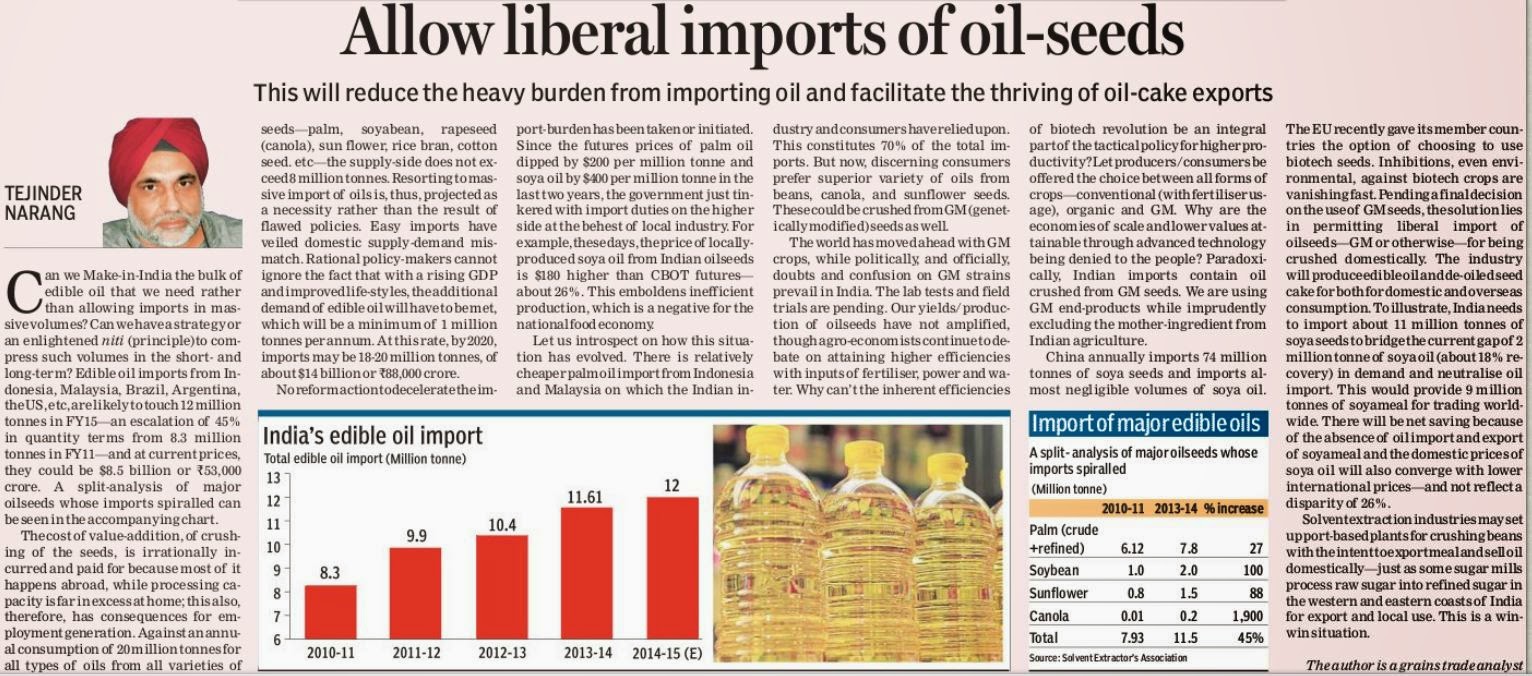ALLOW LIBERAL IMPORT OF OIL SEEDS
FINACIAL EXPRESS 11.02.2015
FINACIAL EXPRESS 11.02.2015
“MAKE EDIBLE OILS IN INDIA” BY FREELY ALLOWING
IMPORT OF OILSEEDS
LET NITI AAYOG TAKE
THIS STRATEGIC AGRO- INITIATIVE
Tejinder Narang
Can we “Make in India” bulk of
edible oil rather than allowing its gargantuan import? Can we have a strategy
or an enlightened “Niti” to compress such volumes on short and long term? Edible oil imports from Indonesia, Malaysia,
Brazil, Argentina, USA etc. are moving up to 12 million tons in 2014-15—an
escalation of 45% in quantity terms from 8.3 million tons since 2010- 11-- and
at current prices they could be $8.5 billion or Rs 53000 crores.
(Chart 1)
( Source-Solvent Extractor’s
Association)
A split- analysis of major
oilseeds whose imports spiralled can be seen in chart2
Chart2.
(Source-Solvent Extractor’s
Association)
The “value addition” for crushing
most of the seeds abroad is irrationally incurred and paid, while there is far
in excess processing capacity at home for employment generation and demand
satiation. Against annual consumption of
20 million tons for all types of oils from all varieties of seeds- palm ,soybean,
rapeseed (canola), sun flower, rice bran, cotton seed etc., supply side does
not exceed 8 million tons. Resorting to massive import of oils is thus
projected as a necessity rather than resultant conclusion of flawed policies. Easy
imports have veiled domestic supply demand mismatch. Rational policymakers cannot
ignore the fact that with rising GDP and improved life styles, additional
demand of edible oil will have to be met which will be minimum 1million tons
per annum. At this rate by 2020, imports may be 18-20 million tons or about $14
billion eq. to Rs 88000 crores.
No reformist action to decelerate import pull
has been taken or initiated. Since
futures’ prices of palm oil dipped by $200pmt and soy oil by $400pmt in last
two years, Government just tinkered with import duties on the higher side at
the behest of local industry. For example, these days price of locally
produced soy oil from Indian oilseeds are $ 180 higher than CBOT futures—about
26% (see chart3). This emboldens inefficient production which is negative for
the national food economy.
Chart 3
(Source—Sopa Nov prices
&CBOT)
Let us introspect how this
situation has evolved. There is a relatively cheaper palm oil imports from
Indonesia and Malaysia on which Indian industry and consumers have relied upon.
This constitutes 70% of total imports. But now discerning consumers prefer
superior variety of oils from beans, canola, and sunflower oil. These could be crushed from GM (genetically
modified) seeds as well.
The world has moved ahead with GM
crops, while politically and officially doubts and confusion on GM varieties
prevails in India. Lab tests and field trials are pending. Our yields/ production of oilseeds have not amplified, though agro-economists
continue to debate on attaining higher efficiencies with inputs of fertilizer,
power and water. Why inherent
efficiencies of bio tech revolution cannot be an integral part of the “Niti”—a tactical
policy for higher productivity? Let producers/ consumers be offered choices
of all forms of crops—conventional (with
fertilizer usage) or organic or GM. Why economies of scale and lower values
attainable by end use of advancement of technology are being denied? The Prime Minister too have repeatedly urged
for transferring of abundance of “Lab” research to the “Land” for
transformation of Indian agro potential.
Then why the issue is being ducked?
Yet, paradoxically, Indian trade
imports edible oil crushed from GM seeds.
Its consumption is allowed freely. We are using GM end products while
imprudently excluding and ignoring its intimate relationship with the mother
ingredient. This is illogical and smacks of dual standards.
China is annually importing 74 million tons of
soy seed and importing almost negligible volumes of soy oil. Last week EU has given
option to member countries to choose usage of biotech crops, which was hitherto
a complete prohibition. Inhibitions, even environmental, against bio tech crops
are vanishing fast vis-a vis their benefits. Indian isolation in this respect
is unwarranted.
Chart4
(Source—USDA)
Pending a final decision on the seeding
of GM crops by the Governments or Courts, the solution lies in permitting
import of oilseeds—GM or otherwise- freely by the actual users industry. The
industry shall produce edible oil and de-oiled cake (soybean meal etc.) both
for domestic and overseas consumption. For
example, India needs to import about 11 million tons of soy beans to bridge
this current gap of 2 million tons of soy oil (about 18% recovery) to
neutralise import that would provide 9 million tons (82%) of soymeal for
trading worldwide. There will be net
saving in hard currency by absence of import of expensive oils, export of soymeal
and domestic prices of soy oil will also converge with lower international
prices –and not reflect a disparity of 26% as explained above.
Solvent extraction industry may
set up port based plants for crushing beans with intent to export meal and sell
oil domestically—just as some sugar mills process raw sugar into refined sugar
at the west and east coast of India for export and local use. Domestic soy seed
prices will also align with international market. Soymeal will find perfect parity with markets
in the geographic arch spanning from Japan to EU. This is a win-win situation.
Let Niti Aayog think tank
demolish the traditional mind set and start with this transformation in the
agro-sector ================================================================================





No comments:
Post a Comment